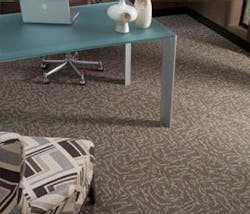Sustainable practices award winners announced
Jerica Sifuentes, a project coordinator and designer at Go Studio in Dallas, has been named the grand prize winner of Zeftron Nylon’s third annual Sustainable Practices Award. The award honors commercial architecture, interior design and facility professionals who are helping create a more sustainable planet by implementing innovative green practices at their work, in their homes and in their communities.
Additionally, Tina Hovsepian, a designer with Duvivier Architects and CEO of Cardborigami Inc. in Los Angeles, has been selected as the runner up.
As a way to further advance sustainable practices, the award requires the winner and runner up to select an environmentally focused charity in which a donation from Zeftron nylon will be made in the winner’s name. Sifuentes selected the Texas chapter of the Nature Conservancy, which will receive a $1,000 grand prize check. Hovsepian selected Cardborigami, her non-profit organization that provides shelter units for the homeless, to receive a $500 runner up donation. Additionally, both Sifuentes and Hovsepian received a cash prize of $250 and $100 respectively as a means to recognize and further foster their green efforts.
Sifuentes was selected among numerous entrants for the multiple green activities she incorporates at her work, in her home and in her community. A portion of those activities include: convincing the owner of her company to participate in a building-wide recycling program; reusing cardboard tubes that hold architectural drawings for other purposes; maintaining an organic garden; using a vermiculture to responsibly eliminate excess waste; and donating a portion of her electric bill to solar initiatives.
Hovsepian was named runner up due to her extensive green lifestyle, as well as her ability to incorporate sustainable initiatives into her non-profit organization, Cardborigami. Designed to eliminate homelessness, Cardborigami, which plans to be fully operational by the end of 2011, develops portable shelters made of 100 percent post-consumer recycled cardboard. Folded into an origami structure to provide instant, portable space for the homeless, the units are water-resistant, flame-retardant and can be opened and closed in less than a minute, providing both the basic necessity of privacy and protection from the elements.
